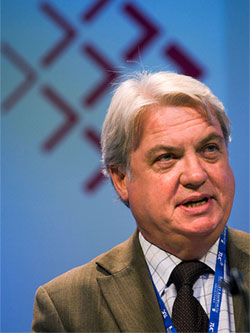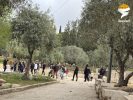It is often forgotten that BDS is a three letter word. To achieve real success and a free Palestine we need to make progress on every front: B D and S. Unfortunately life never follows neat lines but hopefully BDS is a linear progression getting stronger all the time. In the UK we are doing well going from B to D but next we need to get to S and S is for Sanctions.
One of the problems of London being described as a hub of BDS by Israeli political “think-tank” the Reut Institute (1) is that other countries think you know the answers. Of course you don’t; but you can talk of our experience in this country.
B is for Boycott
Boycott action is most often individual in-actions leading to collective ends. Not buying settlement goods leading to supermarkets not stocking them. It is an opportunity for mass campaigning; it is a call to individuals or corporations not to do something but to make the choice not to.
There is a growing set of boycott successes with significant individuals like Stephen Hawking refusing to go to Israel; the TUC’s largely successful campaign aimed at having settlement goods removed from British supermarkets; the Co-operative’s decision to stop using suppliers which operate in illegal Israeli settlements; the closure of Ahava’s flagship store in London; and the takeover of G4S’s AGM by shareholders demanding that it pull out of its contracts with Israeli prisons settlements and checkpoints. The list is growing ever longer. Current campaigns are focussed on SodaStream and its high-profile stockist the John Lewis Partnership; G4S and its bid for the BBC contract; and getting Sainsbury’s to end its indifference to Palestine and adopt an ethical policy similar to the Co-op’s.
D is for Divestment or is it Disinvestment?
Divestment is about trying to get institutions to make a decision to withdraw support for Israel. The aim is to take investments out of certain companies not to award contracts to or have contracts with complicit firms. This demands another range of tactics.
Along with Omar Barghouti and others I recently took part via Skype in a grass-roots conference in San Francisco. It was a great local initiative talking about Veolia coming to grips with it both as a bad employer and as a complicit firm. I explained to the conference that in my experience there are three strands to a successful divestment campaign.
The first is putting the legal and technical arguments to those involved in the decision-making process in particular giving those politicians who are supportive of BDS the information they need. In Britain there are a range of legal constraints on decision-makers which limit severely what you can do by way of political lobbying. For example much is made of commercial confidentiality so much so that individuals on the decision-making panel might not even know the names of the companies involved in the tender.
In this context the key message that we focus on is “grave political misconduct” which is one of the issues that can be used legitimately. Below is an example of how this was framed in a recent local campaign:
“Veolia is a company which is complicit in Israel’s occupation. The Geneva Convention prohibits the occupying power from transferring its own civilians into occupied territories and goes on to prohibit significant alterations to the infrastructure. What Veolia does in Israel is not a marginal act. It has a contract with Israel and it makes profits by breaking international law. It is a very clear case of grave professional misconduct and we consider that Veolia should be excluded from any future tenders on those grounds.”
The focus is to give decision-makers a framework within which they can legally make the decision we want.
Secondly it is campaigning with the workforce inside the company. The workers will be worried about their futures naturally so. The task is to convince them that it is in their long-term interests to campaign to get in this case Veolia out of Israel and for the company to stop operating illegally; to convince them that the reputational damage is going to be a greater risk eventually. The Palestine Solidarity Campaign (PSC) is now running campaigns with workforces in Veolia and BT (British Telecom) and with the unions in G4S and hope to launch a campaign soon. These are campaigns not against the workforce but with them. It is not a boycott; it is a campaign to get the company to withdraw from illegal contracts because it’s in their own best interest to do so.
Finally and perhaps most importantly there is the community campaign which is normally the driving force. It is the building of a coalition of activists students faith groups and politicians. The aim is to build pressure on the company and the decision-makers and to generate publicity. The timetable of the contract decision-making process quite often gives a clear focus for campaign activity.
These three strands need to work in unison reinforcing each other. When the final decision comes if it is not to award the contract to Veolia or any other complicit firm it is important to claim the victory: the decision is always said by such companies to be for some other reason.
S is for Sanctions
As the successes demonstrate the solidarity movement is good and getting better at both boycott and divestment. Our weakness has been at a national political level. This is about shifting the political paradigm; getting inside the tent and trying to move to a tipping point when we can make governments start to act. The recent EU guidelines on research funding in relation to the settlements is a first tentative step in this direction.
On the face of it the guidelines are not that controversial. They were explained by European diplomats as merely bringing together in a single place existing regulations.
The core principle is that EU money should only be spent on EU programmes within boundaries recognised by the EU. The self-evident point was that the settlements being illegal and on occupied land do not fit within any definition of where EU money should go.
The publication of the guidelines did not require new approval as they were based on settled policy; but they unleashed a torrent of diplomatic anger from Israel with support from John Kerry and the US. Much to their surprise there was no mood in Brussels to shift on the guidelines themselves. You could detect an almost physical frustration and annoyance with Israel as it assumed a right to be able to tell the EU how it could and should spend its money. It is still the recipient of large sums of money not destined directly to the settlements.
How do we make this shift happen?
The solidarity movement needs to be bigger broader and deeper across the globe. Organisations such as the PSC need to be bigger; to have the additional resources and capacity to take the campaign to ever higher levels. This will mean increasing membership and raising funds from supporters of Palestine not for humanitarian aid but for political action.
The alliances also need to get broader including not just activists and trade unions but also a broad range of politicians community groups and faith organisations and tapping into the growing empathy amongst students.
Finally support needs to be deeper. In unions it needs to go from being national policy to regional and local-level action. The PSC is holding a conference for trade unions at the TUC in April to discuss how this can best be done. Within the Labour Party unions and branches that are affiliated need to raise Palestine as an issue. A Labour Party constituency I visited recently had not discussed the issue in 25 years assuming it to be controversial only to find that they all agreed that they supported Palestine. The debate on Palestine needs to be generated not just in the Labour Party but in all political parties including parties of the left where there is often no strong tradition of supporting the Palestinians. Given the shift in public opinion it is not a debate we should be reluctant to have.
Building broad local alliances will be critical if the solidarity campaign is to grow and multiply. It will be local pressure that will help bring national parties into line not only with their own grassroots but with public opinion as well. In most Western European countries there is public support for Palestine.(2) This is not reflected by governments who seem stuck in a time warp believing that to do anything that could be viewed by Israel as hostile would be unpopular. The reality though is that many people are bemused as to why Israel is allowed to break international law abuse Palestinian human rights hold nuclear weapons and defy the UN with seeming impunity.
One of the reasons for this is that the Palestinian voice unlike that of the Israelis is not heard to anything like the same extent within the corridors of power. As a consequence governments hear a distorted Israeli-filtered version of public opinion that does not reflect what the majority of people are actually saying and thinking. This imbalance is amplified further by media reporting that believes almost without question what one side says namely Israel whilst routinely doubting and challenging any Palestinian account of events. So how do we help make the Palestinian voice heard?
Soft Power
Action will speak louder than words. It will be through the twin arms of BDS and the solidarity campaign on the outside and non-violent resistance within Palestine.
Resistance is the key component without which nothing else is possible but when put together with BDS they become a formidable force which is beginning to worry Israel more and more.
This is the soft power of which Richard Falk the UN Special Rapporteur for Palestine speaks; a soft war about reputational damage. The most recent example was SodaStream for which we have to thank Scarlett Johansson for transforming a campaign that started in the back streets of Brighton into a global phenomenon. Her parting company with Oxfam was an inevitable consequence but how good was it for SodaStream? Would you pay for an ambassador whose very fame brought down on you more opprobrium than ever before?
Israel is increasingly concerned about BDS as was revealed by its recent decision to establish a ministerial task group to fight campaigns. However this worry has not been enough so far to change one jot what Israel is doing on the ground.
A moral case for action
To do that we need to get governments to act and this will not happen until we challenge the moral legitimacy of Israel’s actions. We have moved from “it is not nice what they are doing” to “it is wrong it is against the law”; but we need to get to “it is not acceptable and will not be tolerated”.
We will have to demonstrate not just a legal but also a moral case and it is in this context that racism is Israel’s Achilles Heel. Its policies are based on racism with different laws along with separated and segregated people roads and water. The Wall is a monstrosity in a modern age that the world is silent about. In contrast to the Berlin Wall when Ronald Reagan famously told Gorbachev “If you want peace … tear down this wall!” In contrast Israel is being allowed to build an apartheid reality with different rights for the different peoples who live under its effective control between the River Jordan and the Mediterranean Sea.
To make such a moral case our campaign in support of Palestine must be an anti-racist campaign making anti-racism the basis of all our actions. Historically opponents of Israel’s actions have always been attacked as anti-Semitic. Our challenge is to make anti-racism a strength not a weakness. This is not a tactical ploy; it is because it is morally right. However it will mean that Israel cannot routinely get away with decrying all opponents as anti-Semitic. This will enable us to expose properly Israel’s racist agenda. That is why the PSC has made “Challenging Israel’s racism and Apartheid” its overarching theme this year. It is going from defence to attack. It is about making Israeli racism and apartheid policies toxic. It is about making companies not wanting for good commercial reasons to be complicit with Israel’s illegal and morally indefensible actions.
It is crucially about making it impossible for governments to justify inaction; forcing them to make a moral judgement that they can no longer condone Israel’s actions.
Sanctions can mean many things. To date it has been encouragement and incentives for the Israelis; punishment and sanctions for Palestinians. It is becoming “guidance” to firms and institutions. This is not enough; governments need to make clear to Israel that there will be consequences for its behaviour. There is much that governments have the power to do from funding and commerce and in particular the arms trade.
The challenge is to break through the glass ceiling of inaction that however well we do in bringing Palestine’s plight to the world’s attention the US and Israel with the support of the EU have so far always succeeded in imposing. The only way that seems to have realistic prospects of success is the twin track strategy of Palestinian non-violent resistance coupled with a truly global solidarity campaign based around BDS. S is not only for Sanctions but also for Success.
(1)Building a political firewall against the Assault on Israel’s Legitimacy – London as a Case Study Reut Institute November 2010. Accessed 18 November 2013
(2) 2013 Country Ratings Poll 22 May 2013 conducted by GlobeSpan/PIPA. Accessed 18 November 2013
Hugh Lanning is a British pro-Palestinian activist and former trade union official. He was the Deputy Chairman of the Public and Commercial Services Union (PCS) one of Britain’s largest trade unions until May 2013. He has been the Chairman of the Palestine Solidarity Campaign (PSC) since 2009 and in 2013 was named a vice chair of the group Unite Against Fascism (UAF).











